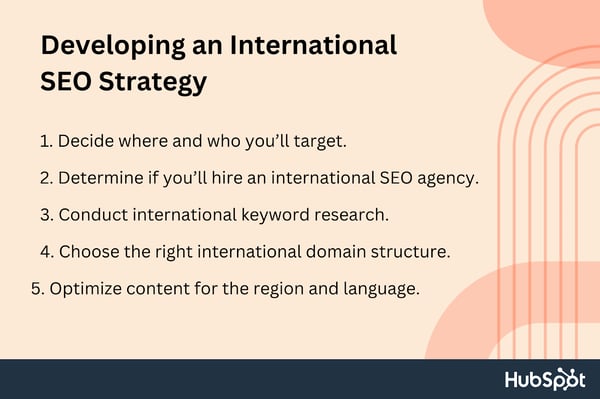Optimizing for the Globe: Mastering International SEO Techniques
Wiki Article
Navigating the Digital Landscape: Leveraging International SEO for Cross-Border Success
In today's interconnected electronic world, organizations are increasingly looking past boundaries to use global markets. Leveraging seo (SEARCH ENGINE OPTIMIZATION) strategies customized for international target markets is essential for attaining cross-border success. The intricacy of navigating the digital landscape on a worldwide range requires a nuanced approach, from comprehending the principles of International search engine optimization to carrying out geotargeting and multilingual keyword phrase approaches. As business aim to broaden their reach and exposure throughout various areas, maximizing website structures and keeping an eye on cross-border efficiency come to be indispensable components of a successful worldwide SEO technique.
Comprehending International SEO Principles
Navigating the intricacies of international search engine optimization needs a solid grasp of basic concepts to successfully broaden online presence throughout borders. One essential aspect of international search engine optimization is understanding the value of localization. This entails tailoring internet site content to fit the etymological, cultural, and business differences of target audience. Keywords have to be not only equated but likewise adjusted to show just how customers in different areas look for information.Additionally, having a clear understanding of geo-targeting is necessary. This includes showing to search engines the certain countries or regions an internet site is targeting. Implementing hreflang tags is one method to communicate this info, guaranteeing that the correct variation of a web page shows up in the search results for a customer in a particular location.
Moreover, understanding the impact of regional internet search engine and social media platforms is crucial for global search engine optimization success. While Google is dominant in numerous regions, countries like China have their own search engines like Baidu, needing tailored techniques for each platform to optimize on-line presence (International SEO).

Targeting Multilingual Key Words Strategies
Creating multilingual keyword phrase strategies is crucial for successfully reaching varied global audiences and making best use of on the internet visibility across various linguistic regions. When targeting multilingual keyword methods, it is crucial to carry out thorough research study to understand the particular search terms and expressions made use of by the target audience in each etymological region. This entails not only equating keywords however additionally considering cultural nuances, local languages, and search fads distinct to every target audience.To develop an effective multilingual keyword phrase approach, it is very important to prioritize relevance and search intent. Key phrases need to align with the content on the site and reverberate with the social context of the target market. Making use of devices such as Google Keyword Planner, SEMrush, or Ahrefs can help identify high-performing keyword phrases in different languages and examine their search volume and competition level.
Additionally, tracking and examining the efficiency of multilingual key phrases regularly is important for optimizing and refining the approach with time. By continually adjusting to modifications in search habits and trends, businesses can improve their on-line presence and draw in more global website traffic to their web sites.
Executing Geotargeting and Hreflang Tags
When aiming to boost global SEO methods, incorporating geotargeting and hreflang tags is critical for optimizing internet site visibility throughout various regions. Geotargeting includes customizing web content to certain areas, ensuring that customers in different areas receive pertinent details. By executing geotargeting, organizations can boost their regional search rankings and bring in region-specific traffic.
Optimizing Web Site Structure for Global Visibility
To even more enhance global search engine optimization techniques beyond geotargeting and hreflang tags, optimizing the internet site framework is essential for attaining international exposure and taking full advantage of reach across various regions. A well-structured site not just improves user experience yet additionally assists in online search engine crawlers in recognizing the content and context of the website. When aiming for global exposure, it is essential to ensure that the internet site is organized in a sensible way that deals with individuals from various nations. Executing a clear my site hierarchy with unique categories and subcategories can help in improving the website's navigating and user-friendliness.In addition, developing language-specific subdirectories or subdomains can help online search engine supply the best version of the internet site to users based on their language preferences, additionally improving the total user experience. Furthermore, maximizing link frameworks to include relevant key phrases and geotargeted terms can boost the website's visibility in different regions. By structuring the site efficiently for worldwide target markets, companies can boost their opportunities of bring in global website traffic and increasing their reach throughout boundaries.

Surveillance and Assessing Cross-Border Performance
Reliable tracking and studying of cross-border performance is crucial for examining the success of international search engine optimization strategies and determining opportunities for enhancement in global reach and exposure. By closely tracking crucial efficiency indicators (KPIs) throughout various markets, companies can obtain useful insights into the performance of their cross-border SEO initiatives. Keeping track of metrics such as natural traffic, keyword positions, conversion prices, and bounce rates can give an extensive sight of just how well a site is carrying out in numerous regions.Examining cross-border efficiency data allows services to recognize trends, patterns, and areas for optimization. By comparing efficiency throughout various countries, regions, or languages, business can determine effective strategies and localize material to much better satisfy specific target audiences. Additionally, keeping an eye on cross-border efficiency makes it possible for services to stay active and receptive in the ever-evolving electronic landscape. Normal evaluation of SEO performance on a global scale guarantees that business can adjust their methods promptly to take advantage of arising opportunities and maintain an affordable side in global markets.
Conclusion
Finally, global search engine optimization plays a critical function in accomplishing cross-border success by optimizing websites for international exposure, targeting multilingual search phrase methods, executing geotargeting and hreflang tags, and check my blog keeping track of cross-border performance. By recognizing the basics of international search engine optimization and optimizing internet site frameworks accordingly, organizations can properly reach and engage with their target market across various areas and languages. This tactical approach is crucial for broadening market reach and driving online development in today's digital landscape.Report this wiki page